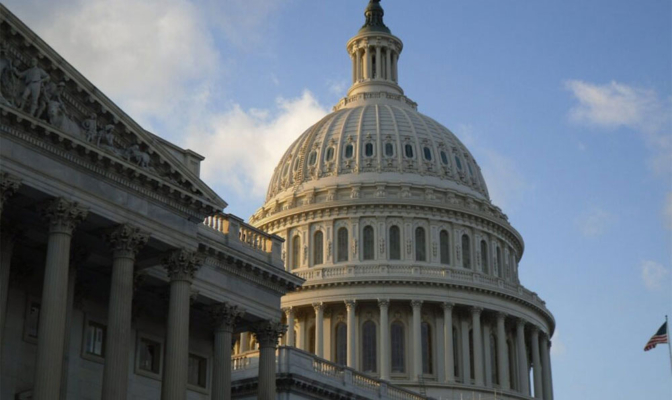The U.S. midterms have surprised the country – what does that mean for the U.K?
The parallels between U.S. President Joe Biden and U.K. Prime Minister Rishi Sunak may not be immediately obvious. Yet, in 2022, both are battling to control the political narrative around the economy, both have an incumbent administration that’s overseen COVID-19 and rising inflation, and both have big characters with blonde hair waiting in the wings for an electoral comeback.
It’s the U.S., though, that’s just had an election (something the UK seems averse to with three Prime Ministers in the past four months without a General Election), with the midterms taking place on 8 November. And, even as several races remain undecided, it’s the U.S. that’s beginning to understand which ways the political winds are blowing.
Despite polling that forecasted a Republican storm in the House of Representatives and a potential major upset for Democrats in the Senate, these political winds so far appear to be a light breeze. Enthusiasm for major victories in Florida and flipped seats in blue states like New York has been generally blunted by Republican candidates’ inability to meet the high expectations set for them. Such a lacklustre result for the opposition party in a midterm election should take some wind out of Republicans’ sails, especially considering their inability to capitalise on the incumbent president’s all-time-low approval ratings and rising inflation across the country. Even if Republicans emerge with a slim majority in the House, the last two presidents fared much worse. In their first midterms, Barack Obama lost 63 seats and Donald Trump lost 40. With pundits predicting losses in the 10s to 30s, Biden will be happy to have come out relatively unscathed.
Yet the outcome seems to be unsatisfactory for the Democrats too. Even if the party manages to hang onto power, U.S. politics will be divided in more ways than one. In Congress, no matter which party emerges in control, the margins will be tight and the partisanship so severe that legislation, if any, is unlikely to pass smoothly. Among the electorate the midterms were fought on impassioned issues, such as abortion rights and electoral integrity, highlighting that the polarised nature of U.S. politics had not disappeared as fast as Biden would have hoped in his two years of relatively stable governing.
What is clear is that these elections were as highly charged and expensive – with electoral spending expected to top $16.7 billion – as ever. We won’t know the final outcome for a few weeks, with a run-off election for the Senate expected in Georgia, and even then it will take time for the full impact on U.S. politics to be felt. Specifically, we don’t yet know whether this result stops Donald Trump from launching his campaign for re-election next week. For Trump, do the disappointing results for candidates he backed, such as Mehmet Oz and Bo Hines, coupled with a huge win for Republican challenger Ron DeSantis, deter him from standing again? Or does it fuel his fire and motivate him to drive an even bigger wedge in the already polarised electorate?
For the U.K., it’s an election that may not mean much in Westminster now but could indicate which way the political wind could blow for Prime Minister Rishi Sunak. The UK’s polarisation in politics hasn’t reached the dizzying heights of the U.S., but as the cost-of-living crisis deepens and impassioned issues like immigration rise, the division going into the next General Election could be greater than ever. Sunak will also know his position is weak, as the incumbent governing party will be defending its role in a health pandemic and rising inflation. He can take heart that the Democrats, as the incumbent, have fared well in this election all things considered. Yet with a fractured party and just over two years to address a cost-of-living crisis gripping the country, Sunak will need more than a light breeze to help him in the next election.
This blog is co-authored by Mark Detlor, Senior Account Executive at H/Advisors Abernathy and Lizzy Tomlin, Associate Director at H/Advisors Cicero. Lizzy is currently participating in the H/Advisors Exchange programme and is spending four weeks in Washington D.C. with H/Advisors Abernathy. This initiative enables consultants to spend one month working inside other agencies within our global network, to help broaden our connections and to expand our international insights.
As part of this initiative, H/Advisors Cicero is also welcoming James Bourne, Senior Vice President in H/Advisors Abernathy’s Los Angeles office, to spend a month working in London.
Elizabeth Tomlin, Associate Director
H/Advisors Cicero
[email protected]
Mark Detlor, Senior Account Executive
H/Advisors Abernathy
[email protected]


